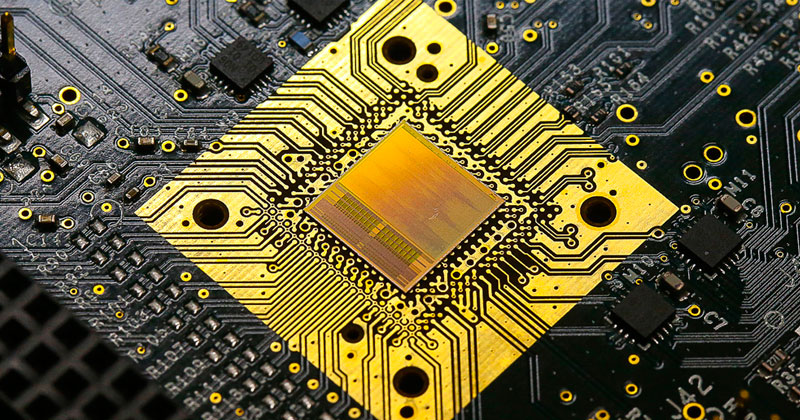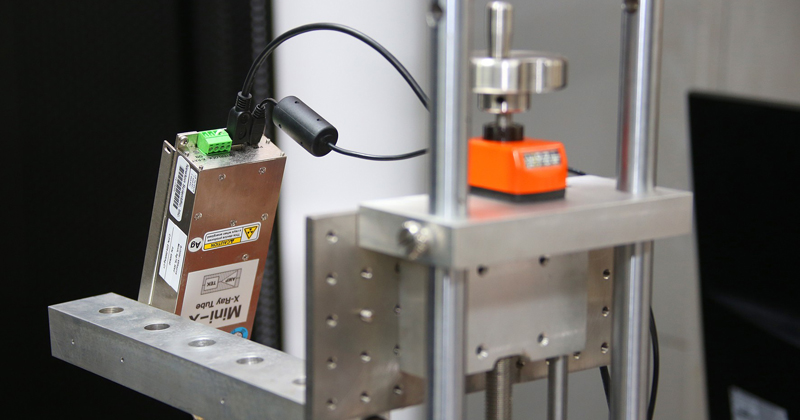Totally developed in Brazil, chip will be in particle detectors in the Alice experiment of the Large Hadron Collider.

The final production phase of the Sampa chip, developed in Brazil especially for the experiment called Alice (A Large Ion Collider Experiment, one of the four major experiments at the LHC – Large Hadron Collider), has been given the green light by an international committee of reviewers, made up of experts in microelectronics. The LHC is the world’s largest particle accelerator; and is located on the French-Swiss border. The Sampa prototype has been validated after submission of the results of the tests performed on the chip in different places: Brazil, Cern, Sweden, France, Russia, USA and Norway.
After that meeting, called Production Readiness Review, international reviewers issued a favorable opinion regarding the immediate production of the chip which will be used in the Alice experiment. That capped a five-year-long project headed by USP researchers from the Physics Institute (IF) and the Polytechnic School (Poli), which also relied on the participation of researchers from Unicamp, and whose funding was provided by the São Paulo Research Foundation (Fapesp). “The project is wholly Brazilian, and a Norwegian scientist was involved in one of its parts. The chip intellectual property is ours”, praises IF Professor Marcelo Gameiro Munhoz, stressing he will follow up on the manufacturing process assigned to TSMC, a Taiwan-based company.
The Sampa chip has been proven to meet the needs of Alice particle detectors in which it will be used, called TPC (Time Projection Chamber) and MCH (Muon Chamber). Upon completion of all tests, the next step is the industrial production of 88,000 units, most of which are meant to be used in the Alice experiment.

The utilization of Sampa will not be limited to basic research. Teams from the Physics Institute are developing detection devices ready to be integrated into the chip as soon as it has been produced. “They are gas-filled radiation detectors; and one of the projects is to use it in X-ray imaging”, Munhoz reveals, saying that another project measures thermal neutrons released from nuclear reactors. According to the scientist, the Star experiment of the RHIC accelerator, at the Brookhaven National Laboratory, in the USA, will be the first to use Sampa in a real experiment application. They have already installed some units to be tested this year; and are supposed to set up all chips they will use next year.
Speed in a compact size
The Sampa chip integrates 32 channels occupying an area of about 82 mm². Its compact size translates into savings of cost, space and power for Alice, in which 17,000 Sampa units will be installed in the TPC, a chamber that is 5 m long and has a diameter of 5 m; and 40,ooo units in the MCH, a device farther from the collisions than the TPC. The higher density of the Sampa channels occupying less space allows it to cover bigger areas and be faster than the current two-chip system, in which one receives analog signals while the other converts them into digital signals. The Sampa chip achieves both of those functions.

The LHC, the largest particle accelerator ever built in the world; lies in a tunnel 27 km in circumference. It is an international collaboration with open access to the 10,00o scientists from 100 countries working directly on the project and involved in four experiments: Alice, Atlas, CMS, LHCb. The equipment will be shut down in 2019 for the performance of upgrades of the four experiments, and will resume operation in 2021. Teams from many countries have jointly taken part in preparing the upgrade. The capacity to produce a high-complexity compact chip motivated the Alice coordinating team to choose the Brazilian team to develop the new front-end chip for the experiment. The Sampa project is coordinated by professors Wilhelmus Van Noije, from Poli, and Marcelo Gameiro Munhoz, from IF.
From the IF Communication Department
For more information call Marcelo Munhoz on (11) 3091-6940 or email munhoz@if.usp.br; or call Professor Wilhelmus Van Noije on (11) 3091-5668 or email noije@lsi.usp.br.
